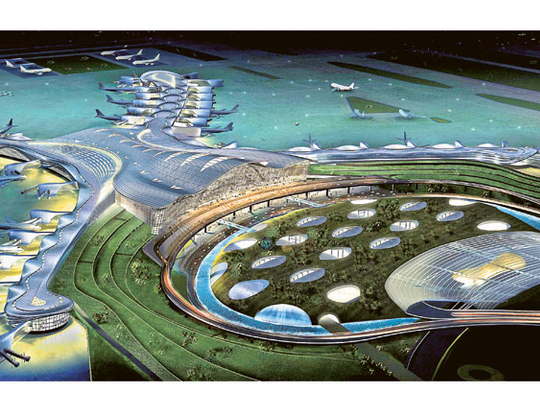
Abu Dhabi: The Abu Dhabi Government has approved the construction of the Midfield Terminal Complex (MTC), part of a $6.8-billion (Dh24.95 billion) expansion plan for the capital's international airport.
Abu Dhabi Airports Company (Adac) announced in a statement yesterday that it has received approval from the Executive Council for the construction of the MTC, which is planned to become the primary gateway for airlines operating to Abu Dhabi and the future home of Etihad Airways, the national airline of the UAE.
"The Midfield Terminal Building is expected to go live in the first half of 2017," the statement said.
Impressive structures
The terminal building will be the largest in Abu Dhabi and one of the region's most architecturally impressive structures. It will be between 630,000 and 702,369 square metres in size, and visible more than 1.5km away.
"The central space of the terminal building could hold three full-sized football pitches and features a ceiling 52 metres tall at its highest point," according to Adac's website.
According to Saj Ahmad, Chief Analyst at Strategic-Aero Research, this project will certainly pressure its local rivals to think long and hard about their own airport expansion. "Etihad and eventually its partners like air berlin will reap the benefits of having all operations under one roof in Abu Dhabi with the ability to further expand as passenger traffic rises," Ahmad told Gulf News.
"With Doha opening a new airport just 11 months from now, and with Dubai investing [more] in the current airport, this sort of expansion in the UAE capital may well spawn a low-cost airline from Abu Dhabi to cater to the growing traffic that is expected to come to and through the airport. That said, Etihad's commitment and expansion through this new terminal project will ensure that it can stay as competitive as its other GCC rivals," he said.
The complex will include 20,000-25,000 square metres of retail and food and beverage outlets, which is roughly equivalent to the current size of Marina Mall in Abu Dhabi. These are set around an 8,400 square metre indoor park. Associated support buildings take up an additional 800,000 square metres, and will include access to 16-20 aircraft parking stands.
Strong position
"This development represents one of the largest investments by the Government to deliver the needed infrastructure, in line with Abu Dhabi Plan 2030, that will cater to the growth of the aviation sector in the region and confirms Abu Dhabi's strong position in the global air transportation network. Adac looks forward to appointing the Midfield Terminal Building contractors and creating this key infrastructure asset for the emirate of Abu Dhabi," said Khalifa Al Mazroui, Chairman of Adac.
Last November, six construction companies bid to build the airport's MTB: Al Habtoor-Murray & Roberts, Bechtel-Al Jaber, Hyundai Engineering & Construction-Kumho, Larsen & Toubro-NPC, Samsung-ACC and TAV-CCC.
Adac has not yet announced the winning contractor or the project's value. However, construction of the MTB is planned to commence during the second quarter of this year.
The 700,000-square-metre terminal building is one of the most crucial projects to be undertaken in the UAE and will initially handle 27-30 million passengers per year.
According to aviation analysts at Frost & Sullivan, the MTC will enhance growth in the region's aviation sector. "The improved facilities will help Abu Dhabi achieve a strong position in the global air transportation network," Frost & Sullivan said.
Important role
"However, the air navigation service providers have a very important role to play in service considering the increased levels of air traffic growth."
According to Adac's figures, Abu Dhabi International Airport currently handles more than 12 million passengers a year and growth over the next 20 years is forecast to be robust, requiring more facilities.
Its recorded growth rates of 19.7 per cent over the last five years, have been driven by the rapid growth of its hub airline, Etihad Airways, and the increasing attraction of Abu Dhabi as a destination for business and leisure.












